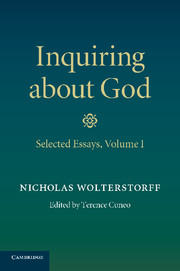Book contents
- Frontmatter
- Contents
- Editor's introduction
- Acknowledgments
- Introduction
- 1 Analytic philosophy of religion: retrospect and prospect
- 2 Is it possible and desirable for theologians to recover from Kant?
- 3 Conundrums in Kant's rational religion
- 4 In defense of Gaunilo's defense of the fool
- 5 Divine simplicity
- 6 Alston on Aquinas on theological predication
- 7 God everlasting
- 8 Unqualified divine temporality
- 9 Suffering love
- 10 Is God disturbed by what transpires in human affairs?
- 11 The silence of the God who speaks
- 12 Barth on evil
- 13 Tertullian's enduring question
- Bibliography
- Index
2 - Is it possible and desirable for theologians to recover from Kant?
Published online by Cambridge University Press: 04 May 2010
- Frontmatter
- Contents
- Editor's introduction
- Acknowledgments
- Introduction
- 1 Analytic philosophy of religion: retrospect and prospect
- 2 Is it possible and desirable for theologians to recover from Kant?
- 3 Conundrums in Kant's rational religion
- 4 In defense of Gaunilo's defense of the fool
- 5 Divine simplicity
- 6 Alston on Aquinas on theological predication
- 7 God everlasting
- 8 Unqualified divine temporality
- 9 Suffering love
- 10 Is God disturbed by what transpires in human affairs?
- 11 The silence of the God who speaks
- 12 Barth on evil
- 13 Tertullian's enduring question
- Bibliography
- Index
Summary
About nine months ago, a very gifted theology student came to my office, said that she had been reading my recently published Divine Discourse, and asked whether she could talk about it. The subtitle of Divine Discourse is: “Philosophical Reflections on the Claim that God Speaks.” That gives an indication of what the book is about.
Could we talk about it? Of course! What author doesn't like the flattery implicit in someone saying, “I've just read your just-published book and would like to talk about it”? She had many insightful things to say. Oddly, however, it is not her insightful comments that have stuck with me so much as two perplexing comments. “What I find so fascinating about your book,” she said, “is that the book begins and you just start talking about God.” I remember thinking to myself: I suppose so. But the project of the book was to reflect on whether God speaks; and that required talking about God. So what else might she have expected? Just then there was a knock at the door and I was distracted; when we got back to our conversation, I forgot to ask her what she meant.
The other perplexing thing she said was this: “What's forward for you is backward for me and what's backward for you is forward for me. There's only one chapter in the whole book that's forward to forward.” I asked her what she meant.
- Type
- Chapter
- Information
- Inquiring about God , pp. 35 - 55Publisher: Cambridge University PressPrint publication year: 2010
- 1
- Cited by



